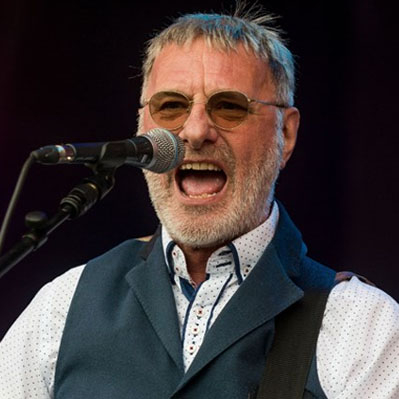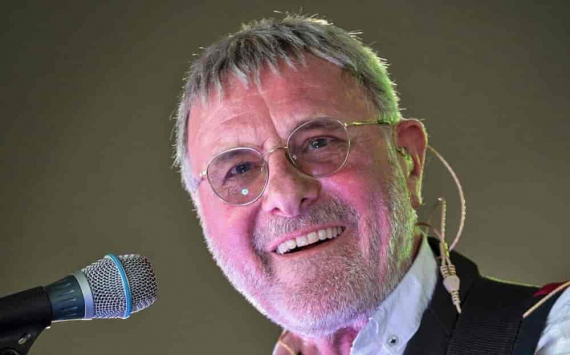
MALCOLM
RONALD
NICE
Stephen
(Steve
Harley)
English singer and songwriter
Date of Birth: 27 February 1951
Date death: 17 March 2024
Age at the time of death: 73 years old
Zodiac sign: Pisces
Profession: Singer
Biography
Stephen Malcolm Ronald Nice, better known by his stage name Steve Harley, was an English singer and songwriter, best known as frontman of the glam rock group Cockney Rebel. He scored five UK hit singles with the band in the mid-1970s including "Judy Teen", "Mr. Soft" and the number one "Make Me Smile (Come Up and See Me)".
Cockney Rebel 1972–77
The original Cockney Rebel consisted of Harley, Crocker, drummer Stuart Elliott, bassist Paul Jeffreys and guitarist Nick Jones. Jones was soon replaced by Pete Newnham; however, Harley felt the band did not need electric guitar, particularly with the arrival of keyboardist Milton Reame-James. They settled on the combination of Crocker's electric violin and Reame-James' Fender Rhodes piano.
During 1972, representatives of Cockney Rebel began to send demo tapes to various labels. Mickie Most discovered the band at a London nightclub known as The Speakeasy Club and offered them their first contract with his RAK Publishing. In turn this influenced the A&R personnel at EMI Records, who then offered the band a three-album deal. With producer Neil Harrison, Cockney Rebel recorded their debut album, The Human Menagerie, during June and July 1973. Their debut single "Sebastian" became a hit across Europe, but failed to chart in the UK. When released in November 1973, The Human Menagerie suffered a similar fate. Despite the lack of commercial success, the album was critically well-received and soon gained cult status.
The Human Menagerie's lack of success led EMI to feel that the band had yet to record a potential hit single. In response, Harley went away to re-work the unrecorded song "Judy Teen", with the objective of making it single material. "Judy Teen" was released in March 1974 and peaked at No. 5 in the UK. During February and March 1974, the band recorded their second album The Psychomodo, which was produced by Harley and Alan Parsons. Released in June, the album peaked at No. 8 in the UK. From May until July the band embarked on a major UK tour to promote the album; tensions grew among them as the tour progressed. On 18 July they received a 'Gold Award' for outstanding new act of 1974; a week later, with the tour finished, several members left over the disagreements. Crocker, Reame-James and Jeffreys chose to quit, having unsuccessfully demanded to write material for the group despite the initial understanding that Harley was the sole songwriter. Following the band's split, the single "Mr. Soft", taken from The Psychomodo, reached No. 8 in the UK.
Left without a permanent band, Harley soon began auditioning new musicians. Meanwhile, Harley and Parsons worked with Dutch singer Yvonne Keeley in the studio. In August 1974, EMI released her version of "Tumbling Down" as a single, backed by another Cockney Rebel cover, "Loretta's Tale". During September, Harley recorded his debut solo single "Big Big Deal", which was released in November. The song failed to enter the UK Top 50; however, it did enter the unnumbered BMRB's UK Breakers chart. By this time, a new line-up of Cockney Rebel had been finalised. With original drummer Stuart Elliott remaining in the band, the new line-up included guitarist Jim Cregan, keyboard player Duncan Mackay and bassist George Ford. Renamed Steve Harley & Cockney Rebel, they recorded the album The Best Years of Our Lives in November and December 1974, with Harley and Parsons again producing.
In January 1975, the lead single from the forthcoming album, "Make Me Smile (Come Up and See Me)", was released. Becoming the band's biggest hit, the song reached the number one spot on the UK Chart in February and received a UK Silver certification that month. It was also Harley's only chart entry in America, reaching No. 96 on the Billboard Hot 100 in 1976. In a 2002 television interview, Harley described how the lyrics were directed at the former band members who, he felt, had abandoned him. As of 2015, the song has sold around 1.5 million copies in the UK. The Performing Rights Society have confirmed the song as one of the most played records in British broadcasting, while over 120 cover versions of the song have been recorded by other artists.
The Best Years of Our Lives was released in March 1975, reaching No. 5 in the UK. The second single from the album, "Mr. Raffles (Man, It Was Mean)", was also a success, reaching No. 13. The band embarked on a UK and European tour to promote the album. During the summer, the band recorded their fourth studio album Timeless Flight. Around the same period Harley also produced Dutch singer Patricia Paay's album Beam of Light, with members of Cockney Rebel performing on many of the tracks. Later in the year, Harley and the band went on tour in the US as a support act to The Kinks. As the band had not achieved commercial success in the States, the compilation A Closer Look was released exclusively for the American market.
Timeless Flight was released in February 1976, and became a Top 20 UK success, peaking at No. 18; however, the two singles "Black or White" and "White, White Dove" failed to reach the UK Top 50. They reached No. 2 and No. 6 on the BMRB's UK Breakers Chart respectively. Another UK and European tour followed the album's release. Between June and September 1976, the band recorded their fifth album Love's a Prima Donna. In July they released a cover of George Harrison's "Here Comes the Sun", which reached No. 10 in the UK and became the band's last Top 40 single, discounting later re-releases of "Make Me Smile". Love's a Prima Donna was released in October 1976 and peaked at No. 28 in the UK. It also spawned a second charting single; "(I Believe) Love's a Prima Donna", which reached No. 41. In America, "(Love) Compared with You" was released as a single. During August and September 1976, Mackay recorded his second solo album Score, which was released in 1977. Harley wrote the lyrics to four tracks, and provided lead vocals on "Time is No Healer".
In November 1976, Harley provided backing vocals on T. Rex's song "Dandy in the Underworld", which was released as a single from the album of the same name in 1977. In December 1976, the band embarked on an eight-date UK tour to promote Love's a Prima Donna. During the early part of 1977, Harley provided lead vocals on The Alan Parsons Project's song "The Voice" for their album I Robot. In July, Harley disbanded Cockney Rebel, the announcement of which was followed by the release of a live album, Face to Face: A Live Recording, which reached No. 40 and spawned the single "The Best Years of Our Lives".
Mentions in the news
Born in one day
(Rabbit) .
Horoscope Pisces: horoscope for today, horoscope for tomorrow, horoscope for week, horoscope for month, horoscope for year.













































